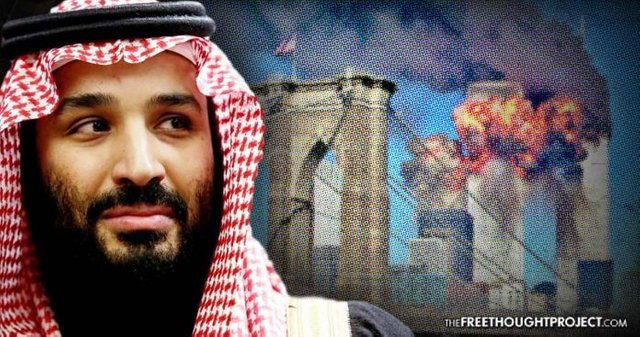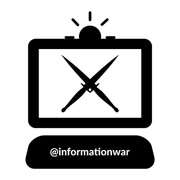Saudi Crown Prince Admits to Mainstream Media That Saudis ‘Financed Terrorist Groups’

In the days after a judge ruled that there is enough evidence for a lawsuit filed by 9/11 victims against Saudi Arabia to move forward, the kingdom’s most powerful monarch is admitting that the Saudis are responsible for sponsoring terrorism.
In a recent interview with The Atlantic, Prince Mohammed bin Salman was asked to comment on his country’s role in providing material support to terrorists. Salman denied any notion the
Kingdom of Saudi Arabia funded terrorist groups. “When it comes to financing extremist groups, I challenge anyone if he can bring any evidence that the Saudi government financed terrorist groups,” he said. But in a surprising admission to what the families of 9/11 victims have alleged in federal court, Salman issued a stunning revelation:
“Yes, there are people from Saudi Arabia who financed terrorist groups.”
However, Salman also said funding terrorists is still against the law in Saudi Arabia.
“This is against Saudi law,” he said. “We have a lot of people in jail now, not only for financing terrorist groups but even for supporting them.”
The prince then turned his attention to the subject of his country’s seige of Qatar. In 2017, Qatar was the recipient of a Saudi-led blockade, which Amnesty International claimed was having dire consequences.
The blockade has been, “splitting up families, interrupting students’ education, threatening jobs, raising prices of staple foods in Qatar, and leaving residents of the region facing an uncertain future.”
Salman went into great detail to reveal why Saudi Arabia’s blockade of Qatar has been put into effect.
He alleged Qatar is funneling funds to groups that threaten the national security of Saudi Arabia. “One of the reasons we have a problem with Qatar is that we are not allowing them to use the financial system between us to collect money from Saudis and give it to extremist organizations,” Salman said. Earlier in the interview, Goldberg attempted to call into question the role of Wahhabism.
He referenced Saudi funding of Madrassas (Islamic schools) all around the world as evidence that the oil-rich monarchy has actually fueled terrorism, by teaching extremism to children. Salman was very cautious, one might say, when addressing the role of Wahhabism.
One reason for doing so could be that he was afraid to speak critically of the very extremists whose teachings allow for honor killings, capital punishment for homosexuals, a segregated (by sex) Saudi society, and religious oppression throughout the Saudi kingdom. He was seemingly in denial Wahhabism even exists, let alone brainwashes millions of young people throughout the world.
“No one can define Wahhabism,” Salman insisted. “There is no Wahhabism. We don’t believe we have Wahhabism.”
Attempting to deny completely the very existence of Wahabbis in the country, he stated, “We believe we have, in Saudi Arabia, Sunni and Shiite.” Salman completely avoided any criticism of Wahhabism.
In addition to refusing to allow it to be defined, he went further by clearly stating that it does not exist. It was not the most shocking statement Salman made. Many reading the transcripts of the interview might think the comments Salman made regarding the State of Israel were the most surprising. Not only did the progressive prince acknowledge Israel’s right to exist, he stated they have a right to live in peace alongside Palestinians. When asked about Israel’s claim to their ancestral homelands, Salman stated unequivocally:
“I believe that each people, anywhere, has a right to live in their peaceful nation. I believe the Palestinians and the Israelis have the right to have their own land. But we have to have a peace agreement to assure the stability for everyone and to have normal relations.”
Much of the interview was focused on Prince Salman’s disdain for Iran’s supreme ruler, Ali Khamenei, whom Salman equated to Adolf Hitler. Comparing the two, Salman stated:
“Hitler didn’t do what the supreme leader is trying to do. Hitler tried to conquer Europe. This is bad…But the supreme leader is trying to conquer the world. He believes he owns the world. They are both evil guys. He is the Hitler of the Middle East. In the 1920s and 1930s, no one saw Hitler as a danger. Only a few people. Until it happened. We don’t want to see what happened in Europe happen in the Middle East. We want to stop this through political moves, economic moves, intelligence moves. We want to avoid war.”
Few Americans will have any sympathy if and when it is revealed that any ruling Monarchy in Saudi Arabia funded the 9/11 attacks. Not only will the families be asking for monetary compensation, it is highly likely they will be calling their Congressmen and asking for much more punitive measures. In other words, they will want revenge.
Nevertheless, Prince Salman has been spending a noticeable amount of time and energy courting American power brokers and promising reforms in one of the world’s most intolerant countries. Stopping short of promising to end the oppression of women by his country’s religious leaders and legal system, Salman spoke with nostalgia of his country in the 1960s. Comparing that era with the modern-day practice of mandating women have male guardians while in public, Salman remarked:
“Before 1979 there were societal guardianship customs, but no guardianship laws in Saudi Arabia. It doesn’t go back to the time of the Prophet Muhammad. In the 1960s women didn’t travel with male guardians. But it happens now, and we want to move on it and figure out a way to treat this that doesn’t harm families and doesn’t harm the culture.”
When Salman was pressed on the genocide currently taking place in Yemen and the role Saudi Arabia has played in making it worse, he side-stepped much of the criticism but stated his country’s reasons for bombing Yemen.
“We fought to get rid of extremists in Syria and Iraq and then they started to create a haven in Yemen. It would be much harder to get rid of extremists in Yemen than Iraq or Syria. Our campaign is focused on helping the legitimate government and bringing stability. Saudi Arabia is trying to help the people of Yemen.”
Saudi Arabia is largely a Sunni nation. Their mortal enemy, whose leader Prince Salman equated with Hitler, is Shiite. The war between the world’s most dominant Muslim faiths is being played out in proxy wars in Africa and the Middle East. But a larger World War could emerge if Iran does not cease its funding of rebel groups, and Saudi Arabia does not, likewise, cease its funding of terrorist organizations. Salman seemed worried about the possibility of a larger, global conflict. He said:
“We are pushing back on these Iranian moves. We’ve done this in Africa, Asia, in Malaysia, in Sudan, Iraq, Yemen, Lebanon. We believe that after we push back, the problems will move inside Iran. We don’t know if the regime will collapse or not—it’s not the target, but if collapses, great, it’s their problem. We have a war scenario in the Middle East right now. This is very dangerous for the world. We cannot take the risk here. We have to take serious painful decisions now to avoid painful decisions later.”
One painful decision Salman and his country will have to face is how they will handle the impending lawsuit being brought against the Saudi Kingdom from its allies in the United States. Lawyers for the plaintiffs, the families of victims from the 9/11 attacks, are likely prepared to battle in a court of law, and the 9/11 Commission has already done much of the work for them.
As The Free Thought Project has reported, the final 28 pages in the 9/11 Report clearly revealed—even though the U.S. government attempted to prevent the information from being released—that Saudi officials played a role in the attacks. The time for the royal family of Saudi Arabia to answer for its role in killing thousands of Americans is long overdue. No amount of charm and wooing by its Prince can prevent the reckoning.

We are the Free Thought Project — a hub for Free Thinking conversations about the promotion of liberty and the daunting task of government accountability. All of our content was created by our team of artists and writers. Learn more about us on our website thefreethoughtproject.com.
I think i have to live until I'm about 80 years to know the full truth of how much the Saudis have disrupted the American lifestyle..... guess I'll quit smoking and cross my fingers...
of course the American lifestyle is made possible in part by loads of cheap Saudi oil.
That's one of my biggest questions, why do we do business with these guys on oil or anything else? They don't feel like an "ally" to me and I can't think of one thing I've heard that would say they stabalize a damn thing........ it stinks
they have it and we want and need it. We can live like we do thanks to plentiful oil. Also they oppose Iran, the enemy of my enemy is my friend.
I hear you there, one day the time of kings will be over I hope. Something tells me it won't be soon though.........
I hope the days of cheap oil never end.
I dont know if two whole lifetimes could uncover their secrets!
True enough. One day one of us who tries to sort through this may be the "giant who's shoulders the next generation stands on" so to speak. Thanks to folk like you the work is getting done.
NOICE
lol
I am hardly surprised how little press this receives, not long ago the media quietly reported that Obama had supported Hezbollah smuggling cocaine into the US, ordering the DEA to stand down and then they dropped the story. The president aiding terrorists in drug smuggling and somehow that is not the story of the century!
it is telling, what the media decides to ignore
I think that Prince Salman is sincere about trying to clean his country up... he's jailed quite a few of the "bad actors." I think it's elements within the Royal family funding the terrorists but not the Prince... It's just difficult to discern exactly who has the power there.
Good point, it seems that there is definetly a power struggle taking place
Curated for #informationwar (by @openparadigm)

Relevance: A new coat of paint for Saudi Arabia
Our Purpose
I think the privitisation/farming out of Saudi's terrorist program, which Mark Sloboda mentioned on Monday's Crosstalk episode, is the especially worrying part of the issue; b/c now there's nobody directing the Wahhabist terrorist groups who will choose their targets themselves, unconstrained by their masters' politics (however little good that has achieved).